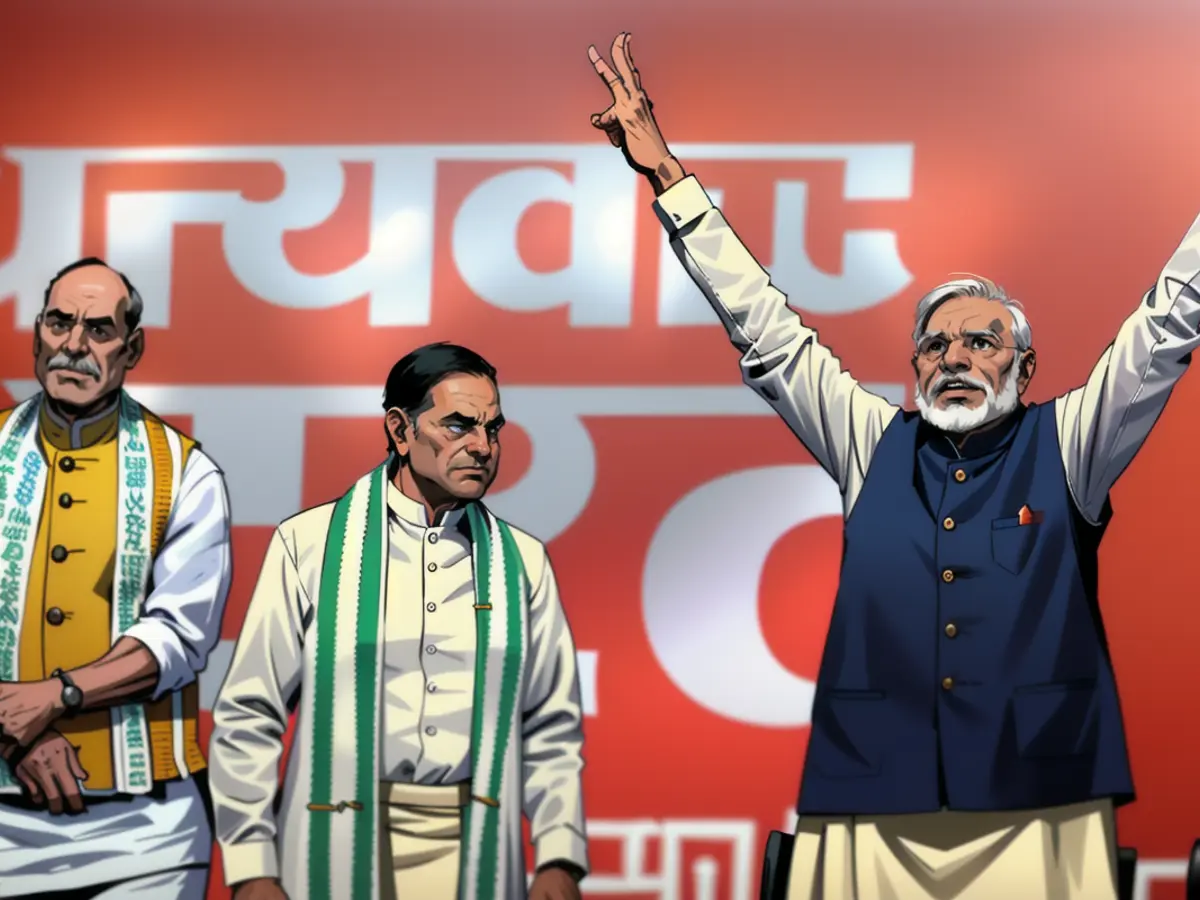Indian Parliamentary Elections Result in Wins for PM Modi's Third Term Despite Inconveniences
The Hindu nationalist BJP party, led by Prime Minister Narendra Modi, managed to secure 239 seats in the 543-seat Indian parliament, marking the first time in a decade that they failed to achieve a majority. This triumph is prompting the BJP to rely on coalition partners for governing. The election commission has revealed that the ruling coalition, headed by the BJP, has a minimum of 291 seats in New Delhi. While this is fewer than the 303 seats they took five years ago during the previous elections, Modi is satisfied with the results, proclaiming that "India has once again shown faith in our leadership."
Meanwhile, the opposition Congress Party attained almost double the number of seats they had previously, with 99 out of a total of 543. Congress leader Rahul Gandhi chimed in, stating that the public had "punished" the BJP. He was confident that "the people of India would provide the correct answer."
Modi, who has been re-elected in his constituency with a margin of 152,300 votes, acknowledged that the BJP had suffered some losses. Five years ago, the difference was nearly half a million votes. Modi's primary rival in New Delhi, Arvind Kejriwal, failed to make it to the top as he was arrested in March on corruption charges just prior to the start of the elections.
Despite ongoing allegations of a democratic decline in India, Modi and the BJP persisted with targeting specific population groups during the election. Critics have accused the BJP of using government institutions to target political opponents. Human rights groups and political enemies of the BJP have accused the party of favoring the Hindu majority in the country. During the campaign, Modi referred to the 210 million Muslims in India as "intruders" and "underclockers" due to the number of children they have. Despite the numerous complaints against the prime minister, he chose to ignore them.
While facing these criticisms, Modi has led India to significant international standing. Through sheer force of diplomacy and his role as an important counterweight to China in Asia, Western states view India as a crucial ally. Additionally, India's thriving digital economy makes it a key trading partner.
Providing a political shake-up in a largely peaceful electoral period, the Indian parliamentary election is the world's most extensive democratic vote, with over 968 million people summoned to participate in the process over six weeks. The meticulous counting was conducted by special computers.
However, the impressive showing of the opposition spooked the market, causing the Sensex index to fall by seven percent on Tuesday. The share price of Adani Enterprises, the largest division of the Adani Group and a close ally of Modi, plummeted by 25 percent. The largely lower turnout was also attributed to a severe heat wave that has been plaguing the country. At least 33 election workers succumbed to heatstroke on the final day of the elections.
Read also:
- The election results in New Delhi highlighted a successful term for Prime Minister Narendra Modi, allowing him to begin his third term in office.
- The modes of campaigning during the Indian parliamentary election included targeting specific population groups by the Bharatiya Janata Party (BJP).
- Despite criticism and allegations of democratic decline, Prime Minister Modi garnered significant international standing for India.
- Rahul Gandhi, leader of the opposition Congress Party, expressed dissatisfaction with the election results, claiming that the public had "punished" the BJP.
- The Prime Minister, Narendra Modi, won re-election in his constituency with a larger margin than in the previous term, but faced losses in other regions.
- The parliamentary election in India, held in New Delhi, was marked by a surge in opposition party support, causing a shake-up in the political landscape.
- As the BJP relies on coalition partners for the governance of the nation, third-party involvement in the parliamentary election has become a prominent factor in Indian politics.







